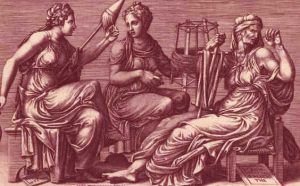The Moirai ( fates ) in Greek Mythology

The word “moira (fate)” comes from the verb “moirazo-share”, the “share”, the part that everyone gets from the sharing of a whole. Thus, Moira means above all the share that everyone claims in life and happiness. Imagine sharing the meat of an animal. It happens, as they cut it, that someone else gets a small or large “piece”, this is how it happens in life. Some live many years, some less, some are happy and some are not.
They believed that the thread of life was spun by the Moirai twice during it: once at birth and once at marriage, because they were two important events for its further course. Nestor, the king of Pylos, for example, was in antiquity an ideal of life, thanks to the favor of Fate: he lived a long time and from his marriage he had many sons. The case of Achilles is, at the same time, a typical example of the perception that many years of life do not necessarily mean that they are full of joy and happiness: Achilles in the Iliad speaks of his fate, knowing that he is doubled by his mother Thetis: he may have a long but insignificant life, if he returns to his homeland, or chooses to stay and fight in Troy, to be distinguished for his war achievements, but also to die young. His name will be associated with glory and everyone will remember him as a great hero in the present and in the future, as it finally happened.
Indicative of the role played by the Moirai in the birth of man is the myth of Meleagros. When a woman wanted to know the fate of her newborn son, she guarded the Fates, the night they would come to decide on the baby’s life, so she heard from Klotho how beautiful it would be and from Lachesis how it would be possible. Atropos, however, shouted that the child was going to die soon and showed a burning wood that was burning in the fireplace.
Then he said that this will happen as soon as the torch is fired. After the Squadrons left the chamber, the mother grabbed the half-charred wood, extinguished it and threw it deep into a chest. She kept the secret of her son’s life hidden for years and he grew up and beautified. When he once went hunting with his mother’s brother, he quarreled with him over the division and, in his anger, killed him. When she found out, she immediately ran to the chest, took out the torch and threw it in the fire. As soon as she was completely burned, her son gave up his last breath.
In the Trojan War, Zeus‘ son Sarpedon fights bravely against Patroclus, who has almost defeated him. Zeus watches the duel and is in pain for his son, so he thinks of opposing fate and avoiding the death of Sarpedon, who loved him very much. He entrusts Hera with the thought of changing what is written, but she brings him to his senses with her words, she reminds him of the great displeasure he will cause to the other gods.
He finally bows down and throws bloody crumbs on the ground to show his sorrow. A little later, when Hector is dueling with Achilles and he is about to be killed, Zeus confesses to Athena how much he would like all the gods to be able to agree, in order to change his fate and save him. Athena responds to him just like Hera, so Zeus obeys again.
In the most critical moment of the match, however, he takes a golden scale, in order to judge objectively who will prevail. On each side he puts a fate of death and balances it. Eventually, Hector’s side weighs in and must now die.
Apollo, who until then constantly protected him, abandons him. In Homeric epics, then, Fate is something given from the beginning of life. But the Moirai are simply the instrument in the service of the gods, who carry out their will. The thread of life is essentially spun by those who determine the events, the adventures, the wealth and the death for each person. The gods can and have the power to change destiny, since they themselves define it at the beginning of mortal life.
